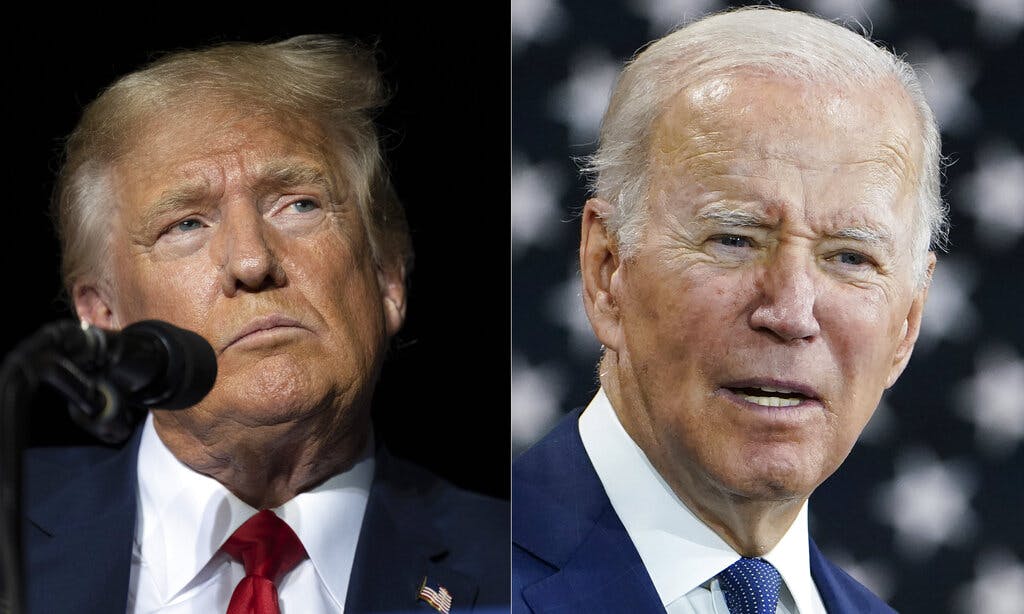More Voters See the 2024 Presidential Election as ‘Extremely’ Important When Trump Is on Ballot: Poll
Negative partisanship will likely be driving voter turnout on both sides in 2024.

President Trump’s presence on a 2024 GOP ticket would increase the importance of the election in the minds of voters, according to a new survey. Mr. Trump’s ability to drive turnout, both in support and in opposition to his candidacy, is unique in the Republican field and could be decisive in the 2024 election.
A new Fox News poll found that in a matchup between Mr. Trump and President Biden, 80 percent of respondents would consider it “extremely” important that they “show up to vote in the presidential election.”
For comparison, the proportion of voters who see it as extremely important to vote drops to 67 percent when Governor DeSantis replaces Mr. Trump on the ticket and 63 percent when Ambassador Nikki Haley replaces Mr. Trump on the ticket.
The proportion of voters who would say it’s “not important” to vote in the election also rises when someone other than Mr. Trump is on the Republican ticket.
With Mr. Trump on the ballot, 10 percent of respondents said voting was not important. With Mr. DeSantis, this number was 13 percent, and with Ms. Haley on the ticket, 16 percent said voting was not important.
The survey of 1,007 voters was conducted by Beacon Research and Shaw and Company Research. The margin of error for the poll was plus or minus 3 points.
The findings of the poll speak to an emerging Catch-22 for the GOP: Mr. Trump would likely turn out more Republican voters than any other candidate could while simultaneously turning out voters opposed to him.
This dynamic was decisive in the 2020 presidential election, which saw voter turnout rise to 66.6 percent of the voting-eligible population, the highest of any election since 1900, according to the United States Elections Project.
Mr. Trump’s unique ability to drive voters who are opposed to him to the polls is also reflected in the survey’s findings on how other Republican candidates would fare against Mr. Biden. The survey found Mr. DeSantis would lead Mr. Biden 49 percent to 47 percent in a hypothetical matchup, while Ms. Haley would lead Mr. Biden 49 percent to 45 percent.
Mr. Trump currently trails Mr. Biden by 48 percent to 49 percent. In October 2019, for comparison, Fox News polling suggested that Mr. Biden led Mr. Trump 50 percent to 40 percent.
The key difference between the support for Mr. Trump and Mr. Biden in 2019 and now is that negative partisanship, the tendency for partisans to be driven in their decision making by dislike for the other side, appears to be working against both Mr. Trump and Mr. Biden.
The American National Elections Studies’s “feeling thermometer,” a measure that allows respondents to express their opinion on a person or topic on a 100-point scale with 100 being the most positive, Republicans now have an average opinion of Mr. Biden comparable to Democrats’ opinion of Mr. Trump.
On average, Democrats had a fairly positive opinion of Mr. Biden, 72.5 points, and a negative opinion of Mr. Trump, 15.2 points. Republicans, for comparison, had a fairly positive opinion of Mr. Trump, 69.2 points, and a negative opinion of Mr. Biden, 14.5 points.
According to the analysis by the senior columnist at Sabato’s Crystal Ball at the University of Virginia Center for Politics, Alan Abramowitz, this increase in negative partisanship against Mr. Biden is keeping Mr. Trump competitive in the general election. “One of the most important consequences of negative partisanship is that crossing party lines to support a candidate from the opposing party has become totally unacceptable to the large majority of partisans,” he writes.
One important factor to watch as the election approaches will be support for third-party candidates. Another key finding of the ANES Pilot Study is that Republicans are significantly more open to a candidate other than Mr. Trump or Mr. Biden.
The study found that 13 percent of Democrats and 19 percent of Republicans were open to voting for “someone else.” While this number is likely to decline as the election approaches and voters pay closer attention, disproportionate support for a third-party candidate among Republicans could cause trouble for Mr. Trump in the general election.

